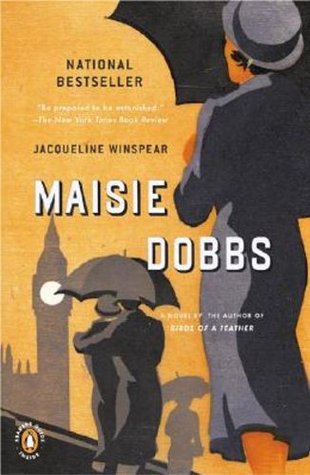 Format read: ebook provided by the publisher via Edelweiss
Format read: ebook provided by the publisher via EdelweissFormats available: paperback, ebook, audiobook
Genre: historical mystery
Series: Maisie Dobbs #1
Length: 309 pages
Publisher: Soho Crime
Date Released: July 1, 2003
Purchasing Info: Author’s Website, Publisher’s Website, Goodreads, Amazon, Barnes & Noble, Kobo, Book Depository
Maisie Dobbs isn’t just any young housemaid. Through her own natural intelligence—and the patronage of her benevolent employers—she works her way into college at Cambridge. When World War I breaks out, Maisie goes to the front as a nurse. It is there that she learns that coincidences are meaningful and the truth elusive. After the War, Maisie sets up on her own as a private investigator. But her very first assignment, seemingly an ordinary infidelity case, soon reveals a much deeper, darker web of secrets, which will force Maisie to revisit the horrors of the Great War and the love she left behind.
My Review:
Any number of people have recommended this series to me, so when the opportunity came along to review the latest books in the series for tours, it seemed like it was time to read at least the first book in the series.
And now I understand why so many people told me to read this series – it’s awesome.
Maisie reminds me more than a bit of Bess Crawford, from Charles Todd’s marvelous series, also named after its nurse/detective protagonist, that starts with A Duty to the Dead. I think that anyone who likes one will probably like the other.
Both Bess and Maisie were nurses during World War I, and the experience changed them forever. Both women have also become private detectives, although that is where the differences between them begin to appear.
Unlike Bess’ story, the bulk of Maisie’s book and her series take place after the war. We do see Maisie’s background, and the tragedy she experienced during the war, but she has moved into the post-war future, and this story takes place in 1929, with flashbacks to earlier years.
Bess is still in the midst of the war.
Also, Bess got into her detecting by accident, where Maisie has deliberately chosen to be a private enquiry agent as a career, and was trained for it, in a rather unusual apprenticeship, by her older friend and mentor Maurice Blanche. In Maisie’s deliberate choice of detection as a career, as well as the methods of Blanche, Maisie reminds me more than a bit of Mary Russell in The Beekeeper’s Apprentice, although firmly without the budding romance.
Maisie’s romantic inclinations, when finally aroused, are fixed on a young man of her own generation, but not one of her own class. Maisie is a costermonger’s daughter who was blessed with a large amount of intelligence and a great deal of luck. She is not of the upper class, or even the middle class, and her apprenticeship begins while she is in service at one of the great houses in the years before the war.
So, in this story, we see Maisie setting up shop as a detective in her own right. Her mentor has finally retired, and it is time for Maisie to try her own wings. Her first major case starts out simply, a man is concerned that his wife’s unwillingness to divulge her whereabouts means that she is covering up for an affair.
Maisie is not happy that her first solo case starts out about a love triangle. But of course it doesn’t end there. In 1929 the late war was still fresh in people’s memories. In this case the war hangs over both the young woman she is investigating and Maisie herself.
Celia Davenham lost her first sweetheart to the war, as so many of that generation did. But he didn’t die, he was horribly disfigured and retreated to a rural farm for similarly injured soldiers called The Retreat. Where he died under mysterious circumstances and Celia has never quite gotten over her grief and her guilt at leaving him after his return.
Maisie discovers that this case is not simple, and that The Retreat may not be quite as benevolent as it first appears. In confronting the secrets kept at The Retreat, Maisie finds herself confronting her own secrets and leftover guilts from the War.
She also nearly gets her assistant killed.
Escape Rating A: There are three stories being told here – one is the story of Maisie setting up her own office and investigating her first solo case. The second is Maisie’s own story, how she rose from housemaid to private detective, with stops at both university and nursing.
Even when Maisie is forced or chooses to put off her own dreams for the greater good, she is always learning. She especially learns a lot about human psychology in her study of philosophy. Her tutorial from Maurice Blanche is certainly singular in its way of dealing with what people are saying in their silences.
Maurice Blanche and Sherlock Holmes would have gotten on like a house on fire. They get to the same place by different but often equally cerebral methods.
The third story in the book is the story of Maisie’s own romantic tragedy. The feelings that she is suppressing form a cloud around her, and the way that she forestalls her own memories until the very end keep the reader from guessing exactly what happened. We all know it ends badly, but we just don’t know how badly until Maisie finally lets her own emotions out, and begins to reach a resolution about her own past.
Maisie Dobbs tells a powerful story about a complicated woman, and about the way that war scars any who come near it.
